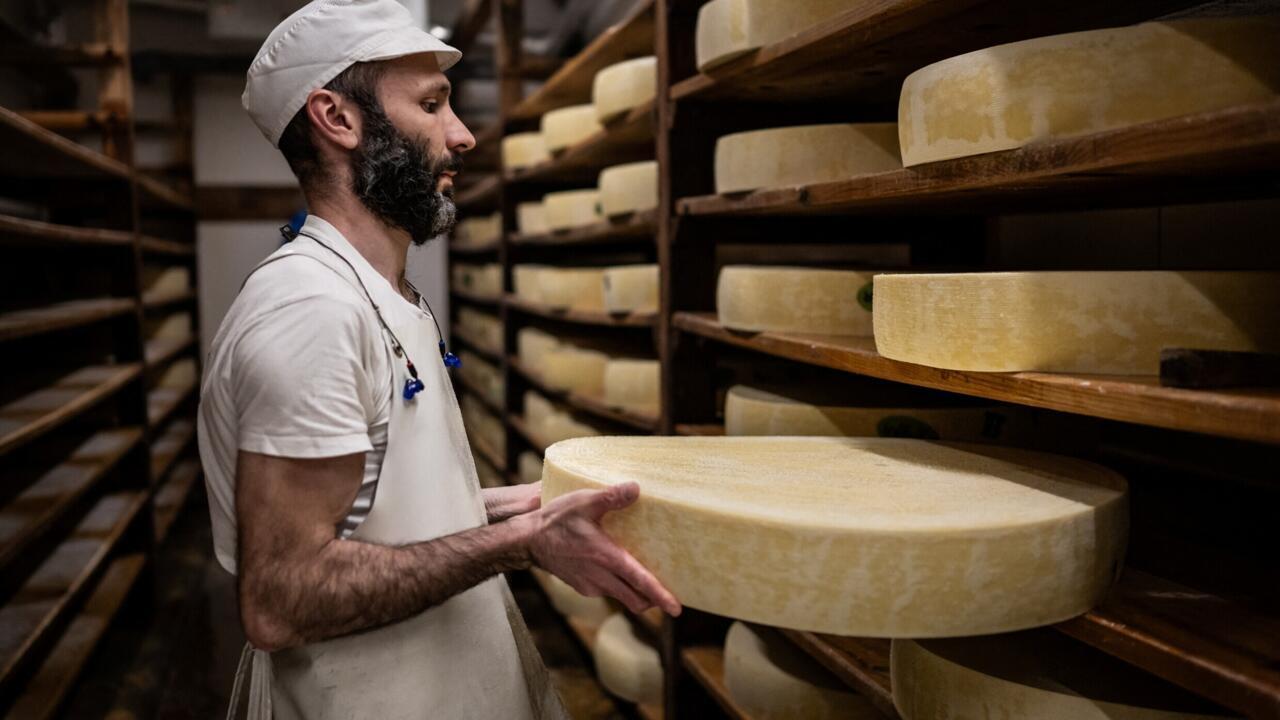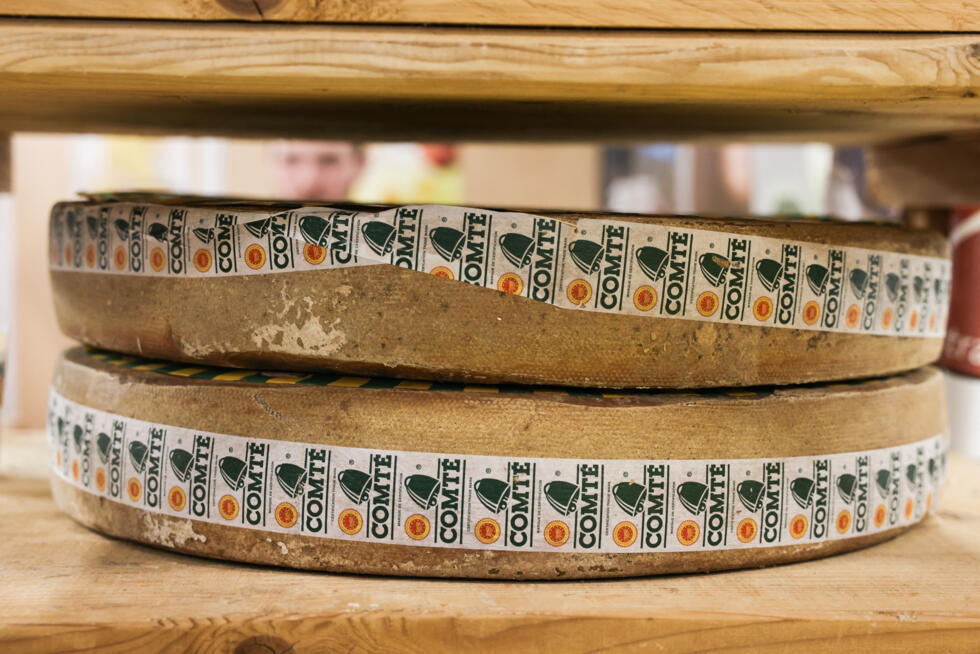‘Victim of its success’: Is France's beloved comté cheese bad for the environment?
Comté is the most eaten AOP cheese in France, but activists claims its very popularity – at home and overseas – is damaging the environment. The milk to make the comté can only be produced on the Jura plateau in eastern France where there are reports of intensification of livestock farming and pollution linked to wastewater treatment.

Comté is France’s most popular cheese with AOP (Appellation d'origine protégée) status, meaning it can only be produced in one location – in this case on the mountainous Jura plateau in eastern France.
Some 1.6 million wheels of the hard-rind cheese were sold in 2022. Now environmental activists are asking whether French – and global – customers should cut back on their consumption.
“For years, the industry has been criticised for the damage it causes to soil and water,” prominent environmental campaigner Pierre Rigaux told French radio station France Inter in April.
Much of the damage, he said, comes from breeding and rearing the Montbéliard cows that produce the milk used to make comté. The cattle are mainly farmed in three French departments: Doubs, Jura and Ain.
“Along with other farming practices linked to comté, their excrement fills the soil with phosphorus and nitrogen. These quickly reach waterways causing a proliferation of algae, the death of fish, and a decline in aquatic biodiversity,” Rigaux said.
A ‘cheese plan’
Cloudy water, white foam, sewage odours and dead fish were reported in 2019 and 2020 near dairy farms in these departments that were found to have major wastewater treatment failures. After an investigation by the regional environmental protection centre in Besançon, two cheese producers were given heavy fines in 2022.
Read moreFrench cheeses on the brink of extinction?
Due to a lack of capacity, treatment plants on site at the two locations were discharging untreated water into surrounding areas with highly permeable soil resulting in “catastrophic consequences for the environment”, according to Besançon’s public prosecutor Étienne Manteaux.
As part of a sweeping “cheese plan” launched in 2022, notices were issued to 14 out of 96 cheese dairies in Doubs to bring their water treatment facilities up to standard and repair faulty pipes.
Nearly all were found to have met the standard in 2024, according to the government department responsible for economic change.
Consequently, famers who provide the milk used to produce comté claim to have a clean production chain that protects the environment.
“Using individual cases of negligence to discredit the entire industry cannot be allowed,” Alain Mathieu, president of the interprofessional committee for comté management told AFP on Monday.
“These attacks are damaging and unfair given the high standards we set ourselves in the region,” he said in response to a national debate sparked by Rigaux’s interview.
The call to eat less comté angered farmers, many of whom posted on social media using the hashtag #TouchePasAuComté (#don’ttouchcomté) along with politicians who supported their cause, including France’s Agriculture Minister Annie Genevard.
"Comté is much more than a cheese: its the fruit of our land, know-how and a source of French pride," Genevard wrote on X.
To display this content from X (Twitter), you must enable advertisement tracking and audience measurement.
Politicians on the right also voiced their support for the cheese. Laurent Wauquiez, candidate for the presidency of Les Républicains party said denouncing comté was akin to envisaging “a France without identity and flavour”.
MPs from France’s hard-right National Rally party, including regional counsellor for Bourgogne-Franche-Comté Julien Odoul, issued a call to “protect” the cheese.
Increased production
The production of comté cheese has some environmental benefits. “The AOP specifications protect natural grasslands, which are carbon sinks and promote biodiversity. Thanks to comté, Montbéliarde cows graze on meadows, which drastically reduces the use of pesticides,” says Jean Burkard, advocacy director at WWF France.
Meadows require up to 12 times less pesticide treatment than traditional agricultural plots, according to WWF, which has just published a report on the importance of protecting France's grasslands.
The problem is that comté is a “victim of its own success”, Burkard says. “The more comté we eat, the more that intensifies production. That means we need more and more cows. Cows create methane and manure, so nitrogen and fertiliser are going to end up in the water.
In the last 30 years, the production of comté has more than doubled from 30,000 tonnes in 1991 to 72,000 in 2004, according to environmental organisation SOS Loue et Rivières Comtoises.
“The number of cows has certainly increased, but they are also producing more milk than they used to which means they are eating more and excreting more … That contributes to the increase of nitrates in our rivers,” the association said.
Global demand
It is not just French consumers who have a taste for comté. It is the most exported cheese in France with 10.7% of all production sold overseas in 2023, a 7.5% growth on exports from the previous year. The biggest international consumers include Belgium, Germany, the United States, the UK and Japan.

This is, in part, because the comté cheese industry has invested in massive international promotion campaigns in the last ten years.
But opponents say there is an urgent need to scale down production. Fisheries warden and member of a local collective for the protection of the Doubs river, Patrice Malavaux, told France Inter there was now an "overproduction of milk”.
"We're making milk to be sold all over the world. It's just not possible. Rivers are not capable of absorbing such quantities of pollution," he said.
The Jura plateau is “a very calcareous, and therefore very porous, environment", Burkard says. “This means that even a small amount of chemical inputs, fertilisers and nitrogen from these meadows will infiltrate extremely quickly into the watercourses. This explains why a lot of our rivers are severely degraded, with some pretty staggering figures on the disappearance of fish species, particularly trout in certain rivers in the region."
The controversy over comté might indicate the extent to which environmental protections so often come second to economics – but also the role consumers play in this equation. “A simple solution would be to remind people that comté is a very good product, and that its impact can remain limited ... as long as we show a little restraint," Burkard adds.
(with AFP)
This article has ben adapted from the original in French.